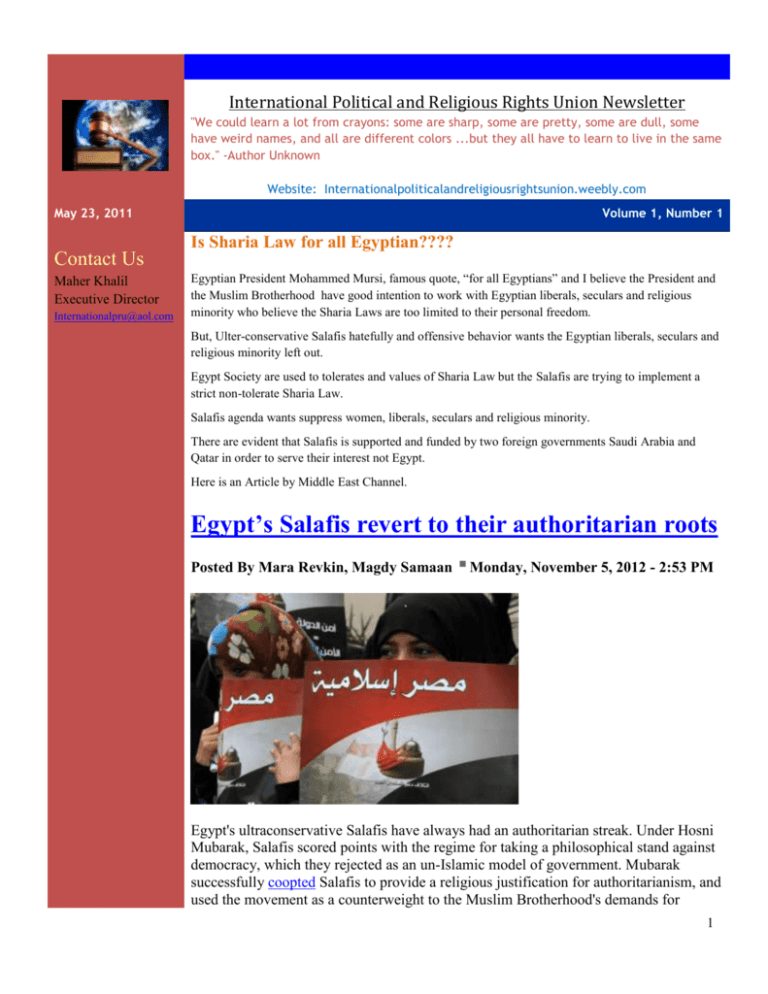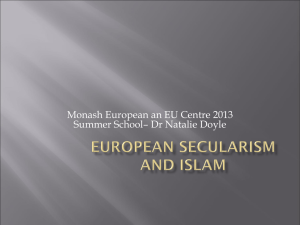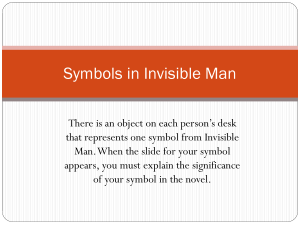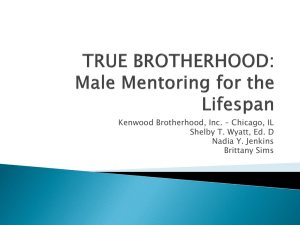File - International Political and Religious Rights Union
advertisement

International Political and Religious Rights Union Newsletter "We could learn a lot from crayons: some are sharp, some are pretty, some are dull, some have weird names, and all are different colors ...but they all have to learn to live in the same box." -Author Unknown Website: Internationalpoliticalandreligiousrightsunion.weebly.com May 23, 2011 Contact Us Maher Khalil Executive Director Internationalpru@aol.com Volume 1, Number 1 Is Sharia Law for all Egyptian???? Egyptian President Mohammed Mursi, famous quote, “for all Egyptians” and I believe the President and the Muslim Brotherhood have good intention to work with Egyptian liberals, seculars and religious minority who believe the Sharia Laws are too limited to their personal freedom. But, Ulter-conservative Salafis hatefully and offensive behavior wants the Egyptian liberals, seculars and religious minority left out. Egypt Society are used to tolerates and values of Sharia Law but the Salafis are trying to implement a strict non-tolerate Sharia Law. Salafis agenda wants suppress women, liberals, seculars and religious minority. There are evident that Salafis is supported and funded by two foreign governments Saudi Arabia and Qatar in order to serve their interest not Egypt. Here is an Article by Middle East Channel. Egypt’s Salafis revert to their authoritarian roots Posted By Mara Revkin, Magdy Samaan Monday, November 5, 2012 - 2:53 PM Egypt's ultraconservative Salafis have always had an authoritarian streak. Under Hosni Mubarak, Salafis scored points with the regime for taking a philosophical stand against democracy, which they rejected as an un-Islamic model of government. Mubarak successfully coopted Salafis to provide a religious justification for authoritarianism, and used the movement as a counterweight to the Muslim Brotherhood's demands for 1 political reform. During the January 2011 uprising, Salafis initially denounced mass protests against Mubarak, claiming that Islam prohibits rebellions against Muslim rulers. When it became apparent that the old authoritarian system was disintegrating, Salafis reluctantly reversed their position on political participation and formed parties as a necessary means to achieve their end-game: a theocratic state. But now that the democratic process is derailing their efforts to enshrine Islamic law in Egypt's new constitution, Salafis appear to be reverting to their authoritarian roots. As liberals and Islamists wrangle over the wording of religious clauses in the draft constitution, the Salafis have reached a pivotal crossroads and must now choose between opposing strategies of compromise and confrontation. The stakes of this decision could not be higher. Tensions over the constitution have triggered the Salafis' militant and exclusionary tendencies, raising questions as to whether the movement will remain committed to the path of peaceful political participation -- which may require unsavory compromises with liberals they have condemned as apostates and heretics -or whether Salafis will resort to violence to pursue their goals. A crucial test will come on November 9, when Salafis have vowed to return to Tahrir Square by the thousands to demand a greater role for Islamic law in the constitution. Another question looming over the Salafis is whether they will overcome their current state of fragmentation in time to contest the next parliamentary elections -- expected in December -- as a unified and coherent coalition. The powerful Salafi voting bloc, estimated between 3 and 5 million Egyptians was a game-changing force in the 2011 to 2012 parliamentary elections, but since then the movement has been crippled by infighting and embarrassing scandals. The largest Salafi party, al-Nour ("Light"), just narrowly survived a debilitating internal feud and is now facing stiff competition from new leftist and youth-oriented Salafi parties that resent al-Nour's cooperation with the Freedom and Justice Party (FJP), which is negotiating the terms of a $4.8 billion International Monetary Fund (IMF) loan that Salafi clerics have denounced as a usurious violation of Islamic law. A year ago, Egypt's ultraconservative Salafis were the underestimated underdogs who swept nearly 25 percent of the parliamentary seats in the first post-Mubarak elections. Now, the Salafi parties that campaigned on vague platforms of religious populism are finally showing their true colors. As Salafis vow to defend their vision for an Islamic constitution against "sinners" and "apostates," it is becoming clear that their commitment to democracy will only last as long as Salafis get their way. While the constitutional process is reviving the Salafis' authoritarian tendencies, internal dynamics within the movement reveal a deeply ingrained hostility toward compromise and moderation. Scandals and schisms have tarnished the Salafis' puritanical image, and they are now deeply embroiled in the partisan horse-trading and rancorous oneupmanship that their parliamentary candidates once claimed to be above. Earlier this year, al-Nour Party's puritanical image was sullied by a string of tabloidworthy scandals involving everything from rhinoplasty to public indecency to antiquities theft. In October, the party nearly imploded over an internal feud between 2 pragmatists calling themselves the "Reformist Front" -- led by the party's founder Emad Abdel-Ghafour -- and a rival camp of hardline conservatives led by the cleric Yasser Bourhami. The rival factions disagree bitterly over the degree to which the party's political apparatus should be separated from its clerical leaders, associated with the Alexandria-based al-Dawa al-Salafiya, which was established in the 1970s and has since served as the theological backbone of the Egyptian Salafi movement. Al-Dawa is a historically apolitical group that has rejected democratic institutions as un-Islamic. The crisis was diffused, at least temporarily, on October 6, after the two sides reached a fragile truce in negotiations that lasted hours. However, al-Nour Party's leadership dispute is symptomatic of broader unrest within the Salafi movement as a whole. The Salafi movement is currently split between five parties with some overlap in their agendas, but also deep divisions on flashpoint issues such as the IMF loan as well as relations with the Brotherhood. With a new round of parliamentary elections fast approaching, two new Salafi splinter parties are aiming to capitalize on the fragmentation of al-Nour. Former presidential candidate, Sheikh Hazem Saleh Abu Ismail, is in the process of establishing a new political party, alUmmah al-Masriya ("The Egyptian Nation"). Meanwhile, the revolutionary Salafi Front has announced the establishment of Hizb al-Sha'ab ("The People's Party), which espouses an idiosyncratic blend of leftist economic populism and Islamic fundamentalism. These deep divisions suggest that the Salafis' entrenched authoritarian tendencies are obstructing compromise not only with other political forces, but also within Salafi parties. This raises the question of whether the embattled al-Nour Party will be able to unify and rebuild itself in time to challenge the FJP in the next parliamentary elections, or if it will be superseded by splinter Salafi parties that are clamoring for a share of the Islamist electorate. This will largely depend on its ability to resolve longstanding tensions between the hardline Salafi clerics who control the Dawa movement and a younger, more pragmatic generation of Salafi politicians who believe that the best way to achieve their religious objectives is through engagement with the political process. The Salafis will face several challenges heading toward the constitutional referendum and, eventually, new parliamentary elections, mainly in the drafting of Egypt's new constitution and in relations with the Muslim Brotherhood. The process of rewriting Egypt's constitution has been the focal point of contestation between Islamist and non-Islamist forces since the imposition of martial law in February 2011. At the outset of the constitutional process, there was a surprising degree of consensus on the content of the religious clauses, particularly Article 2, from the 1971 constitution, which states, "principals of Islamic law are the main source of legislation." Liberals and Islamists viewed the article as too much of a lightening rod to touch, and all parties seemed to have resigned themselves to preserving verbatim the 1971 text to mobilize a minimum consensus. However, in the few months since the formation of the third Constituent Assembly, Salafis have exploited the weakness of liberal and secular political forces to escalate their demands for the expansion of Islamic provisions in the draft constitution. The consensus supporting the preservation of Article 2 has eroded dramatically, and Salafis have gained momentum in their campaign to replace the word "principles" with 3 "rulings" -- a switch that would require Egyptian laws to comply not only with the abstract values of sharia, but with concrete and detailed legal rulings, as Nathan Brown has noted. This subtle rhetorical shift might open the door for restrictions on women's rights and religious freedoms, justified with reference to specific decisions in Islamic jurisprudence. Salafis are also seeking amendments to Article 36, a guarantee of gender equality, which they hope to modify by requiring that the roles of men and women conform to "the provisions of Islamic law." The content of religious provisions in the new constitution will depend heavily on how the Muslim Brotherhood mediates an ideological tug-of-war between ultraconservative Salafis and their non-Islamist opponents over the appropriate relationship between Islam and the state. The relationship between Egypt's Salafis and the more moderate Brotherhood has always vacillated between periods of reluctant cooperation and friction. The two "frenemies" share the long-term objective of establishing an Islamic state, but they disagree on the timeframe and tactics for achieving that goal. The Brotherhood has taken a more gradualist approach and has compromised on strategic concessions to liberals and minorities. Salafis, meanwhile, have accused the Brotherhood of backstabbing and dragging their feet on the application of sharia. Hostilities between al-Nour Party and the FJP are currently on the rise over the controversial religious clauses in the draft constitution. Countering the Salafis' proposed changes to the document, the Muslim Brotherhood is trying to exploit anxiety over the radical demands of Salafis. They are hoping to induce liberal political forces to endorse the lesser of two evils -- a draft constitution accepted by moderate Islamists who share the Salafi's long-term objectives but recognize the pragmatic necessity of making concessions for the proposed charter to survive a popular referendum. The FJP has been willing to make concessions in the interests of completing the constitution before the Supreme Constitutional Court rules in December on the constitutionality of the Constituent Assembly -- a decision that could dissolve the assembly and send the constitutional process back to square one. But while the FJP, held politically accountable for repeated breakdowns in the constitutional process, has a strategic interest in appeasing non-Islamists for the sake of concluding this politically costly and polarizing chapter in Egypt's transition, Salafis have nothing to gain by moderating their positions on Islamic law. As Will McCants has argued, "Their appeal derives from their unwillingness to compromise their ultraconservative values." The September 11 breach of the U.S. embassy in Cairo by protesters put further pressure on the Brotherhood to distance itself from al-Nour Party, whose spokesman, Nader Bakkar, called for and participated in the demonstration. In an open letter, head of the Muslim Brotherhood, Khairat al-Shater, denounced the scaling of the embassy walls as "illegal under international law." While the Brotherhood faces strong incentives to moderate, the Salafis are taking advantage of the Brotherhood's retreat to the center by monopolizing the far-right of the Islamist political spectrum. As the Brotherhood and Salafis increasingly diverge, the prospects for cooperation in parliament and in the upcoming elections will continue to diminish. The tensions between the Salafis and the Brotherhood have important implications for the referendum on the draft constitution and the parliamentary elections that will follow. Unlike the referendum on the military-proposed constitutional declaration in March 4 2011 -- which passed by a decisive 77 percent with the help of the Brotherhood's massive voter outreach apparatus -- it will take more than the Brotherhood's core constituency to pass the new draft constitution. Salafis and liberals will need to vote in significant numbers. Bakkar knows that the Salafis are bargaining from a position of strength: "The Brotherhood needs a coalition with the Nour Party much more than we need an alliance with them," he said. As long as the Brotherhood needs the buy-in of liberals and Salafis to pass the draft constitution, negotiations will remain gridlocked. As Salafis prepare for their demonstration on November 9, there is fear that Islamists may revert to the violent tactics they officially renounced decades ago. An ominous statement by the militant Islamist al-Gama'a al-Islamiya vowing "to fight for the application of God's law, even if that requires bloodshed" suggests that hardline Islamists may resort to radicalism if they are unable to achieve their objectives through peaceful participation in the political process. Militant Islamists proved capable of disrupting the status quo under conditions of repression during Mubarak's rule, and their capabilities are far greater now that they are operating as legally sanctioned political parties under conditions of intense polarization and instability. But while Salafis may be tempted to use violence, they recognize their own limitations, however reluctantly, and have repeatedly backed down from challenging the Brotherhood to save face and avoid an embarrassingly asymmetric confrontation. The Salafis resent the Brotherhood deeply for making concessions to liberal and secular forces, but at the end of the day, Salafis too will sacrifice principles to avoid getting drawn into an unwinnable battle with the party that controls the presidency and the parliament. The Salafis' decision to cancel a much-publicized rally to support sharia on November 2 -- in recognition of their inability to mobilize a mass demonstration without the backing of the Brotherhood -- suggests that the movement is learning to make strategic sacrifices in the interests of self-preservation. But the Salafis' pragmatism only goes so far, and the choice between pursuing their Islamic agenda through politics or violence will be ideological rather than strategic. Mara Revkin is a student at Yale Law School and a former Fulbright Fellow in Oman. She provides research assistance on constitutional reform for the New America Foundation's Middle East Task Force. Magdy Samaan is a journalist working for the Daily Telegraph's Cairo bureau. He was a 2011 MENA Democracy Fellow at the World Affairs Institute and worked as a visiting fellow at the Atlantic Council's Rafik Hariri Center for the Middle East. We will advocate the Egyptian Government and international community to Ban the Salafis, a terrorist and hate group who is funded by foreign nations and spread hate to the Coptic, liberals and women. They are dividing Egypt and spreading hateful messages. WE SUPPORT A CONSTITUTION THAT WILL FIT AND BENFIT ALL EGYPTIAN 5 6







